Have you ever thought about the different things that a frog could do to a log? The frog could be on the log, on top of the log, below or under the log, beside the log, between two logs, or any other infinite number of possibilities.
When I was younger, my teacher used the silly image of frogs and logs to help us remember what prepositions are.
While this is a very simply explanation of the different prepositions, it does serve as a remind of what they are for: describing how different parts of a sentence are in relation to each other.
👉 Preposition Definition
A preposition is a word that tells you how words are related in a sentence. It could often follow a verb, but it does not always. The example of the frog and a log can tell you a lot of them, but those are only one of two categories of prepositions.
In fact, there are two types of prepositions: ones that tell about place and ones that tell about time and time order.
Regardless of which preposition you use, you can change the meaning of a sentence. Be careful about saying that you are coming in, coming from, coming after, coming before, or coming at something!
Each of these prepositions, when they come after the right verb, changes the relationship of the two nouns that would complete that sentence.
👉 List of Common Prepositions
Prepositions of Place
- On
- Under
- Below
- From
- In
- Beside
- Next to
- Between
- To
- At
- With
- Behind
- Up over
- Into
- For
- Concerning
- Despite
- Except
- Along
- Against
- Unlike
- Because of
- Beyond
Prepositions of Time
- After
- Before
- Since
- Until
- From
- During
- In
- On
- Beyond
- At
👉 Prepositions Example
Many of these prepositions can be in phrases, both for prepositions of space and time. These are typically known as prepositional phrases. This includes any descriptor of the space or time that something is in.
For example:
- Under the table
- Along the fence
- Beyond the meadow
- Unlike her peers
- Except for Taylor
- After the show
- Since 2017
- During the game
- In October
- On Monday
👉 What is a prepositional phrase?
These prepositional phrases serve to show the reader or listener where or when something happened.
Some phrases that have prepositions actually function as subordinate conjunctions. This means that the words that follow the preposition have both a subject and a verb.
The prepositions that can form these subordinate clauses are after, as, before, since, and until.
For example:
- After she realized she want to eat cake, she decided to stop by the bakery.
- I walked in the door just as my mom was getting ready to head out.
- Since I decided that medicine was not for me, I had been looking for different careers that might be interesting and fit my personality.
- Until the visa process is easier to navigate, I will not travel to those countries.
Note that, if you take away the preposition in each of these subordinate clauses, you end up with a complete sentence. If you add them in, you need to connect the clause to another independent clause that is related in some way.
Prepositional Phrase Examples
👉 Prepositional Phrase BY
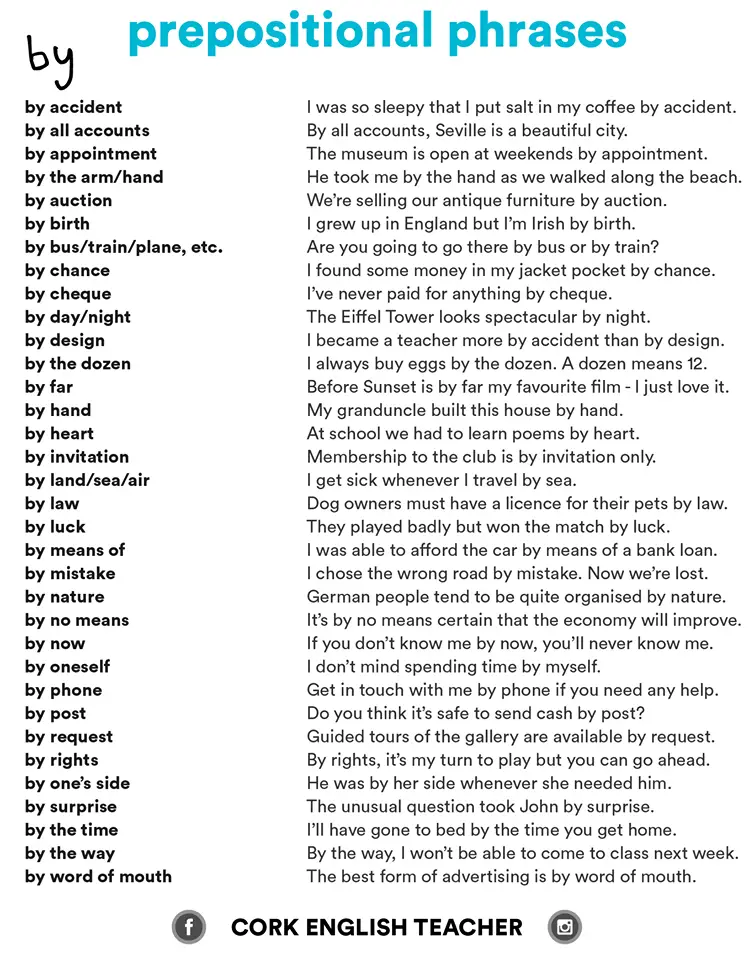
👉 Prepositional Phrase FOR
- I haven’t been abroad for ages. I hope I can go to the seaside for a holiday this year.
- I’m not hungry, I ate a lot for breakfast.
- I know for certain I put my car key in my bag, but I can’t find it.
- I don’t want to work here forever. I’ll quit, as soon as I get a better job.
- Not everybody likes cats. For example, I prefer dogs.
- I don’t go to zoos for fear of huge animals.
- Don’t be mad, I did it for fun.
- We broke up for good. I won’t let him back even if he begs me.
- He will definitely help you. Take it for granted.
- For instance, she prefers tea instead of coffee.
- I bought you a necklace. Take it with you to the exam for luck.
- Being a mother is a job for life.
- I love this job, but the salary is low. I can’t do it for love.
- Could you hold my glass for a moment? I need to find something in my bag.
- I can’t believe he fired me. I worked so hard for nothing.
- I love this place so much. I can imagine I live here for the rest of my life.
- We moved to the seaside for Joe’s sake, because he is suffering from asthma in the city.
- Is it for sale? No, I don’t want to sell it.
- I don’t live here. I came for a visit.
- I go for a walk with my dogs every morning.
- I haven’t visited her for a while.
- I will go for a walk every day from now on.
- I have a headache from time to time, and I don’t know why.
👉 Prepositional Phrase IN
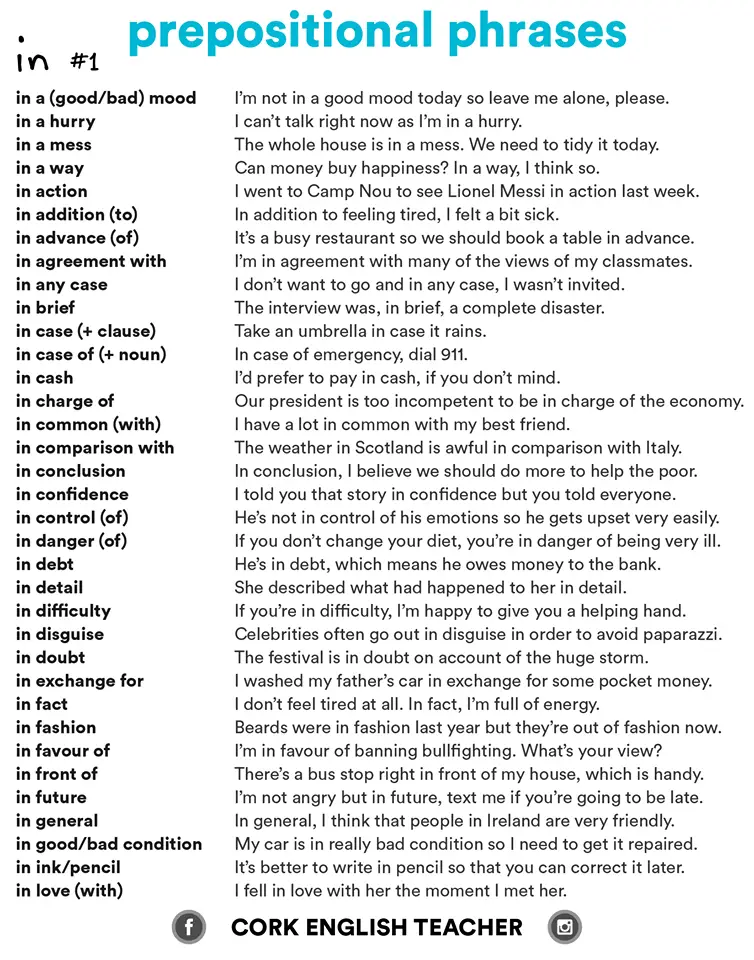
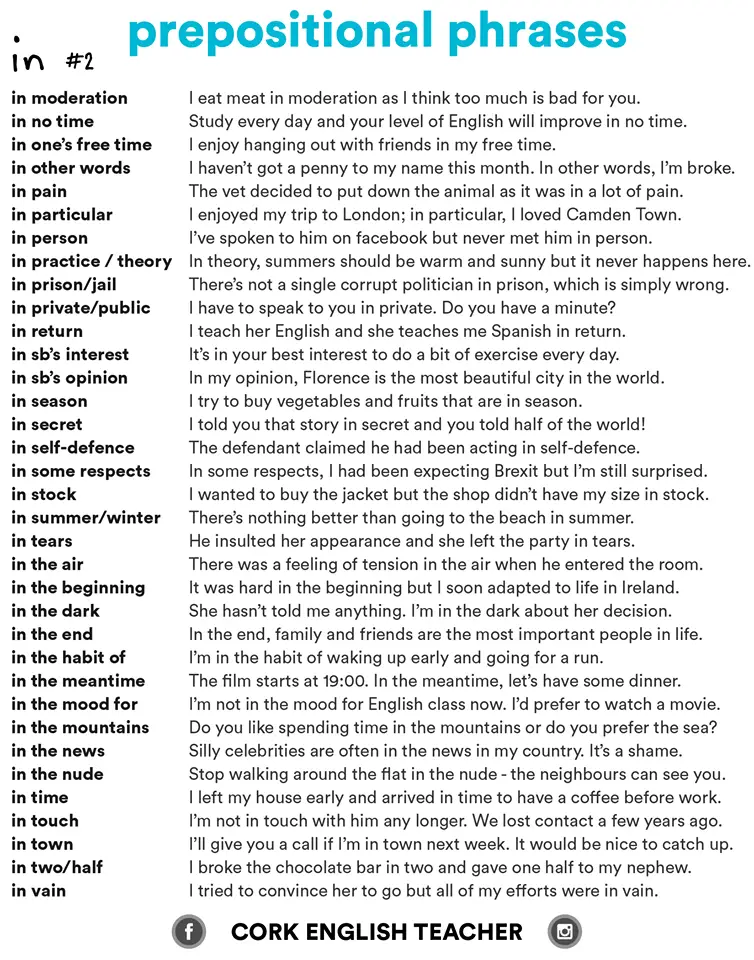
👉 Prepositional Phrase OF and more
👉 OF Preposition Examples
We normally use the preposition OF when we want to connect things to one another, for example:
- The highlight of the holiday was the walking tour of the ancient city.
- The new movie was excellent, but some parts of the movie were very violent.
- The pictures of earth taken from space are incredible.
We can also use OF to show an amount, for example:
- Studies show that 7 hours of sleep per night is the recommended amount of sleep an adult requires.
- Dieticians recommend 0.8 grams of protein per kilogram of body weight.
- To pass the driving test a score of 35 out of 40 is required in the theory part of the test.
👉 TO Preposition Examples
The preposition TO is often used when talking about movement. For example:
- Every evening, the children run to their parents when they get home from work.
- The CEO is flying to Hong Kong this week to visit the new office there.
- The letter was sent to the wrong address.
TO is very often used to indicate a time period. For example:
- From January to July there will be training days every second Friday.
- Most employees work from 9 am to 5 pm, Monday to Friday.
- The English course is from 10 am to 1 pm every day for three months.
👉 There are about 150 prepositions in English
Most common ones are here
- with
- against
- above
- over
- on/ upon
- around
- across
- to
- to the left
- to the right
- outside
- into
- through
- near
- far
- at
- beside
- under
- below
- behind
- backward
- forward
- away
- out
- among
- between
- in front (of)
- far
👉 Use of AT IN ON in English Grammar (Time)
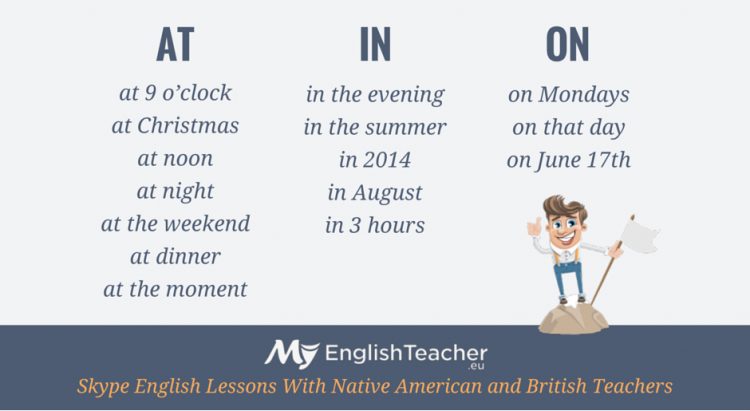
A preposition is a word that connects a noun, pronoun, or noun phrase to some other parts of sentence.
Prepositions can be confusing and difficult for English learners because there is no definite rule or formula for choosing the right preposition!
In the early stages of learning English, you should just try to identify a preposition when you’re reading or listening in English and recognize how it is used.
- to the supermarket
- at the dinner table
- on the sofa
- in an hour
- about myself
A preposition is used to show direction, location, time, or to introduce an object.
Some more examples are listed above!
AT
- at 9 o’clock
- at Christmas
- at noon
- at night
- at the weekend
- at dinner
- at the moment
IN
- in the evening
- in the Christmas holiday
- in the summer
- in 2014
- in August
- in 3 hours
ON
- on Mondays
- on that day
- on June 17th
👉 Difference Between the Prepositions IN and ON!
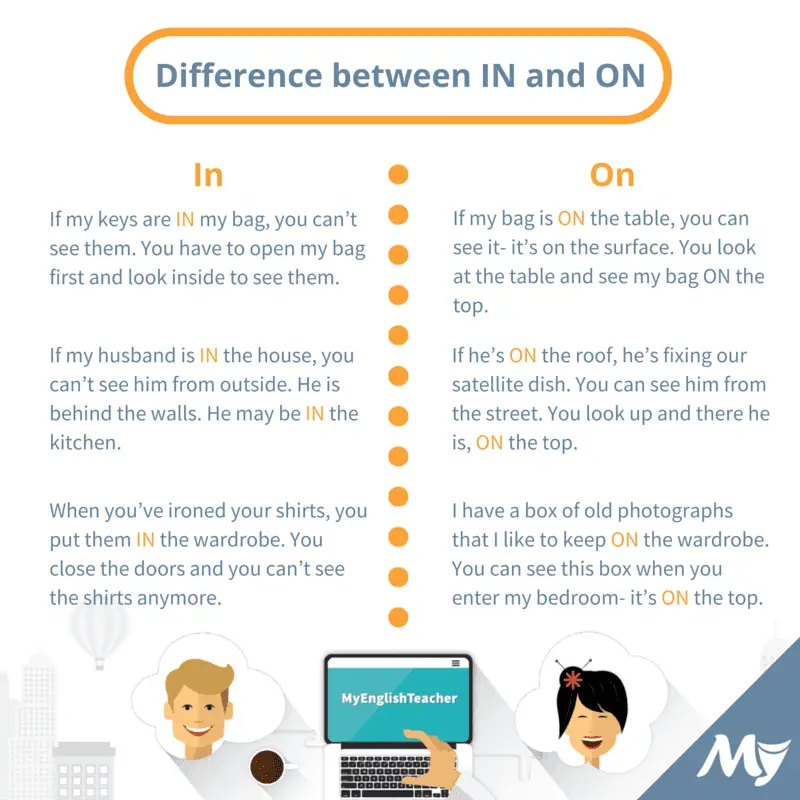
If my keys are IN my bag, you can’t see them. You have to open my bag first and look inside to see them.
If my bag is ON the table, you can see it- it’s on the surface. You look at the table and see my bag ON the top.
If my husband is IN the house, you can’t see him from outside. He is behind the walls. He may be IN the kitchen.
If he’s ON the roof, he’s fixing our satellite dish. You can see him from the street. You look up and there he is, ON the top.
Cats love sitting ON our roof. They never come IN the house.
When you’ve ironed your shirts, you put them IN the wardrobe. You close the doors and you can’t see the shirts anymore.
I have a box of old photographs that I like to keep ON the wardrobe. You can see this box when you enter my bedroom- it’s ON the top.
IN my wardrobe, there are my clothes. ON the wardrobe there is this box. And some dust.
👉 Prepositions IN / ON / AT with words like Playground / Field / Beach
1. Use ‘IN’ when talking about enclosed places.
So, if it is a playground (with swings and slides) enclosed by a fence:
- We spent all morning IN the playground.
The same goes for field: if it is an enclosed one, you can say IN the field, However,
2. ON the playground and ON the field are both correct
when talking about the SURFACE:
- I found this watch on the playground.
or
when the places are OPEN (not enclosed/defined):
- The kids were running on the playground.
3. AT means something like ‘very near’ or ‘next to’:
- Let’s meet AT the playground.
(You don’t have to go inside, but have to be there, very near, so that I can see you if I look at the playground from a distance)
Regarding the BEACH, because it’s an open area, we never say in the beach. It’s not enclosed, we are on its surface, so the correct form is: ON the beach.
👉 Prepositions Phrases: 14 Nouns plus a Preposition
Nouns are often followed by prepositions in English. They form something similar to a phrase that is used over and over again by native speakers. Here is a sampling of popular nouns followed by a preposition.
1. Credit for
this refers to the person who will get the benefit or the praise for something positive being accomplished.
- I didn’t think it was fair that she got all of the credit for the entire team’s hard work.
2. Belief in
refers to someone trusting in or having faith that another person, entity, or organization exist or will do what they say they will do.
- I have a strong belief in the system. Everything will work out the way it is supposed to.
3. Anxiety about
refers to someone being nervous or anxious that something will or won’t happen. When someone has anxiety about something, the situation is making them uncomfortable.
- I have a lot of anxiety about tomorrow’s math test, even though I’ve been studying all week.
4. Addiction to
refers to someone not being able to be without a person, object, or a substance. When someone has an addiction it is usually unhealthy. This is often used to speak about an addiction to alcohol, drugs, food, or some other health issue. While one can have an addiction to something positive, it’s not discussed as often.
- I have an addiction to chocolate, once I start eating one piece, I eat entire bags full every day.
5. Advantage of
refers to someone having a leg up or benefit over someone else. If someone has an advantage they have something extra to help them succeed. The advantage can be anything including physical appearance, money, or connections.
- He had the advantage of height over all of the other players, considering he was five inches taller than all of them.
6. Talent for
means that someone has the potential to be good at something. Someone who has a talent for something may already be established in that thing, or it may be something that they’ve only tried one time.
- He has a newly discovered talent for playing the piano.
7. Responsibility for/ Responsibility to
refers to someone having a duty or obligation to do something. Someone may be being told that they have an obligation to do something or someone may feel like doing something is their obligation.
- You have to take responsibility for your actions.
- It’s not your responsibility to justify his actions.
8. Regret for
means that someone wished something had not happened, or that they did not do something.
- The man had so much regret for his actions, he knew it would be a long time before he would be forgiven.
9. Reason for
refers to why someone is doing something or why something has happened. It doesn’t matter if the reason is good or bad, and it doesn’t matter if the action is positive or negative.
- You better have a good reason for letting the dog in the house right after he played in the mud.
10. Love of / Love for
means that someone really likes something. Someone can have a love for or love of anything. When someone does have a love for something or someone they are really passionate about it.
- He has such a strong love for her, and it’s so beautiful to see.
- The love of money has lead to the downfall of many.
11. Reaction to
refers to someone having a certain feeling or doing a certain action because of something that happened. It can be a physical or emotional reaction.
- He had a reaction to peanuts that caused him to go to the hospital.
- Her squeals of joy were in reaction to seeing her dad after such a long period of time.
12. Ability to
refers to someone or something being able to do something. A person can have an ability to do something, or a machine can have the ability to do something.
- Does this copier have the ability to make copies in color?
13. Memory of / Memory from
refers to remembering something from the past.
- I have so many memories of us playing together as kids.
- I don’t have a lot of memories from that night.
14. Chance of / Chance to
refers to there being a likelihood of something happening or of someone being able to do something. When there is a chance it means something might happen, there isn’t a guarantee that it will happen.
- Is there any chance of us being able to meet tomorrow afternoon.
- Will we have a chance to see each other while you’re on vacation?
Question: Why is the preposition IN used instead of FOR?
Could you please help me? I read this sentence in a grammar book ” Last week, I encountered a friend I hadn’t seen IN five years”.
I got confused about the usage of the preposition. My question is: why the preposition IN is used instead of FOR? Which one is correct? In 5 years OR for 5 years?
Thank you very much in advance!
Answer:
IN is correct, of course, when referring to a period of time. It’s not so frequent as FOR in perfect tenses, but it’s correct.
Look at this slight change: ‘I haven’t seen him in the past five years.’ Doesn’t it sound better?
On the other hand, IN is often used with future forms:
- Talk to you IN 5 days!
- I’ll be back IN an hour.
- I have to find a new job in a month.
IN means NOT LATER THAN in these examples.
Question: Is AT a preposition?
Answer: Yes, AT is a preposition.



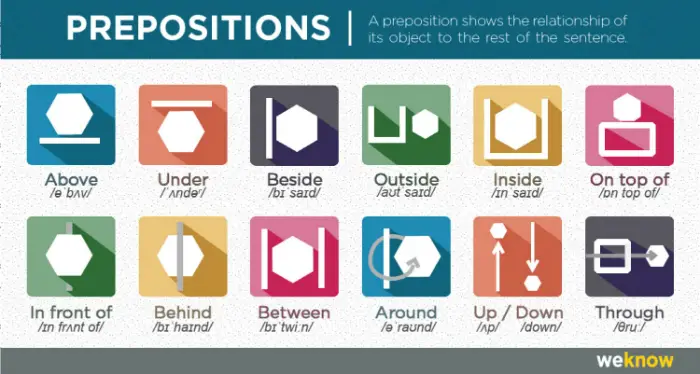
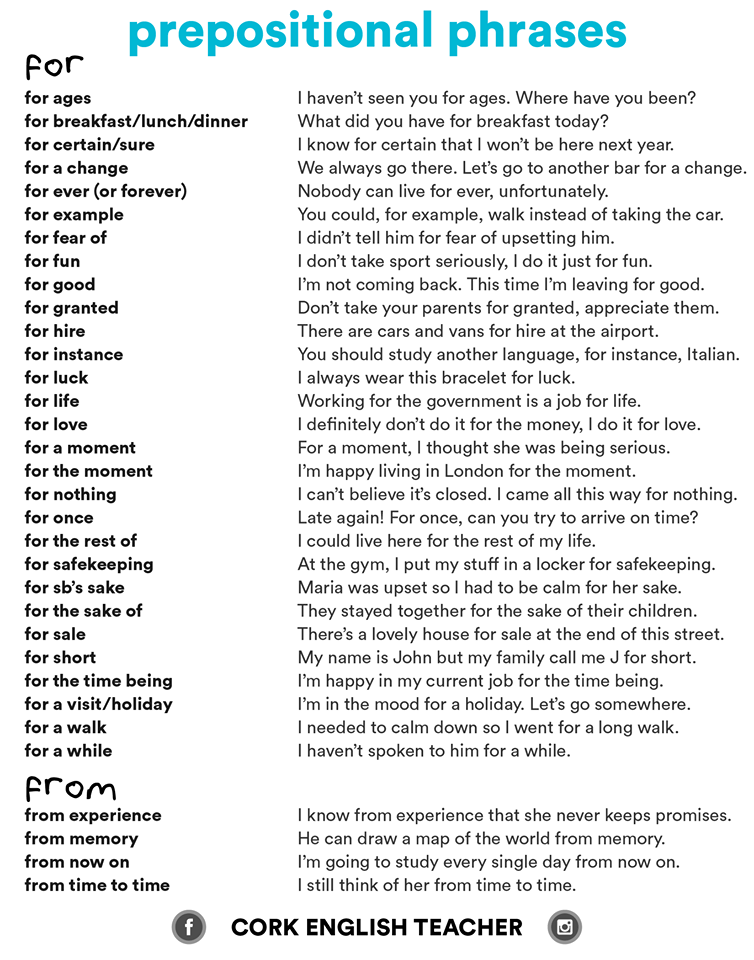
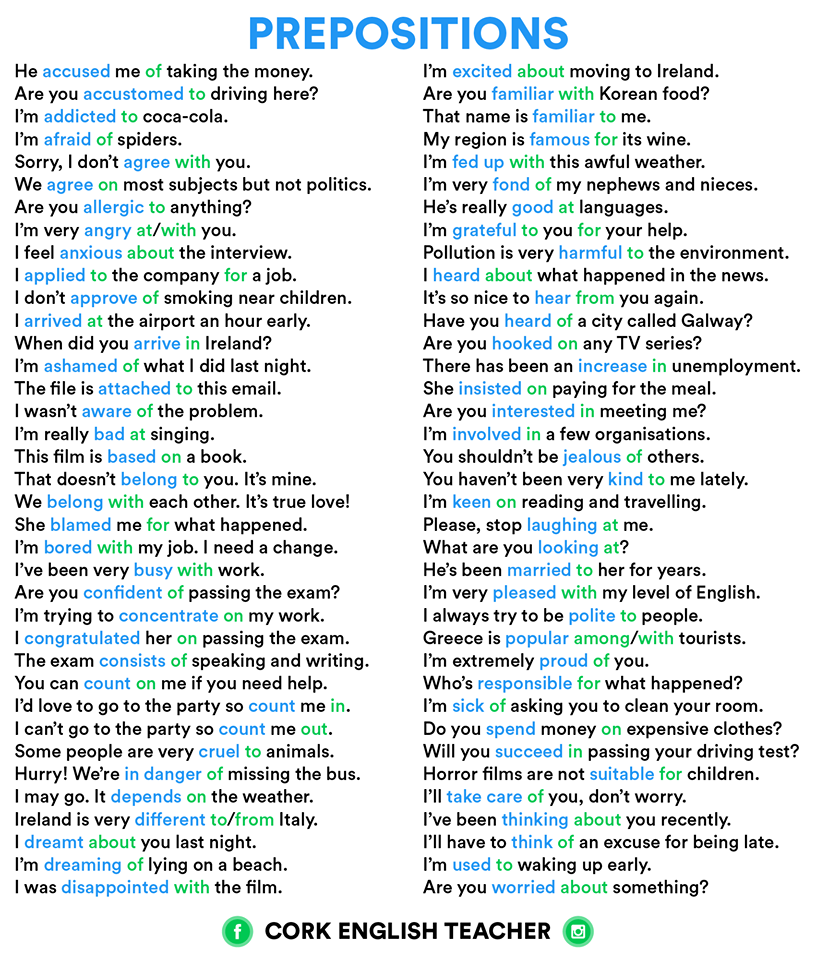






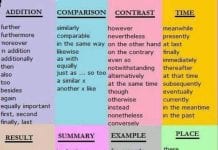
















thank you very much it is very useful.
Glad to help!
Hey its good. It helped me in my assignment. Thanks#myenglishteacher. 🙂
So cool! ?
How can i download these note?
command + P will print the page.
How I wish I could download all the prepositions you mention! I like them very much.
Sure, you can do that! I love this tool for saving PDF files https://www.printfriendly.com/.
Hope this help!
Thanks for that.It helped in my assignment.😊😊😊
Thanks Anastasia mam. It really helped me in my assignment.
thank u so much . i needed it .
it was so helpful thanks
thank you for the phrases. it really helps
Tf
I LOVE THIS WEBSITE. IT HELPED ME IN MY ASSIGNMENT.